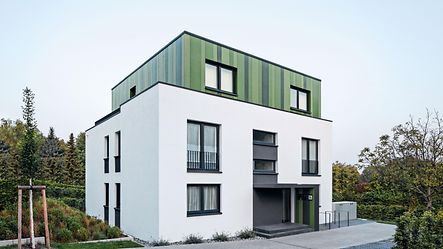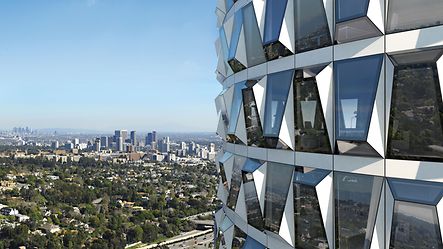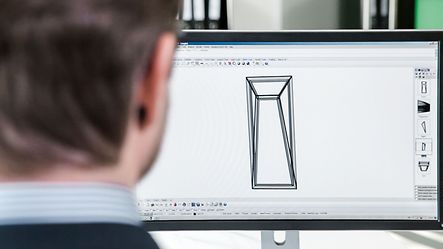Materials for contemporary architecture that lasts
Be it PVC-U, aluminium or steel, each material has its own qualities and very different specifications.
PVC-U ...
... is the most frequently used material for windows in Germany. Due to its excellent cost/performance ratio and its very good insulation properties, PVC-U is often the number one choice for windows. What makes the quality of PVC-U systems from Schüco especially high, besides the benefits in terms of cleaning and maintenance, is above all their durability and the associated cost effectiveness. The source material is high-quality calcium/zinc-stabilised PVC-U, making it environmentally friendly. It also has good light and weathering resistance. Furthermore, the material is impact-resistant and retains its shape even at higher temperatures. One major detail that makes Schüco PVC-U systems stand out from the competition is their integrated sealing technology with the material EPDM. These gaskets have excellent recovery properties, ensuring the best weathertightness for window and door units over their entire service life. Moreover, Schüco PVC-U systems are fully recyclable. Schüco and other leading German manufacturers are members of the Rewindo initiative, which aims to increase the recycling of dismantled building components made from PVC-U and foster economies which use resources efficiently.

The source material is high-quality calcium/zinc-stabilised PVC-U, making it environmentally friendly. It also has good light and weathering resistance. Furthermore, the material is impact-resistant and retains its shape even at higher temperatures. One major detail that makes Schüco PVC-U systems stand out from the competition is their integrated sealing technology with the material EPDM. These gaskets have excellent recovery properties, ensuring the best weathertightness for window and door units over their entire service life. Moreover, Schüco PVC-U systems are fully recyclable. Schüco and other leading German manufacturers are members of the Rewindo initiative, which aims to increase the recycling of dismantled building components made from PVC-U and foster economies which use resources efficiently.
Aluminium...
... is light, solid, easy to maintain, corrosion-resistant and therefore the perfect material for creative and contemporary architecture. Aluminium is so versatile that, in addition to the construction industry, it is also used in car and aerospace construction as well as the packaging industry.
Aluminium is fundamentally an essential material wherever lightness and durability are both needed. The material allows clients and architects virtually unlimited design options, both in the construction of the window and its colour choice. With aluminium, durable windows, doors, sliding doors and façades with high thermal insulation can be fabricated, as thermally broken inner and outer shells are used which are fixed to insulating bars. Aluminium windows have high joint weathertightness, as the frames are very dimensionally stable and only top-quality sealing materials are used. Furthermore, aluminium is 100% recyclable and therefore a continuously reusable material. Old windows and doors are fed back into the A/U/F recycling system (Aluminium und Umwelt im Fenster- und Fassadenbau – Aluminium and the Environment in Window and Façade Construction). By separating out the materials, then shredding and melting the valuable aluminium, it is ensured that new aluminium profiles are made from the old material.

Steel ...
... is a material which is rarely used for private homes, but is commonly used in commercial projects. Steel profiles are very important for modernisations, particularly when it comes to listed buildings.

With slimline, thermally broken steel profiles, the authentic, historical building appearance can be perfectly reconstructed. All of the high standards currently required for thermal insulation and sound reduction as well as fire and smoke protection can also be met. Project-specific shapes such as round, oval arch and gothic arch windows can be perfectly reconstructed – complete with surface textures that look just like the original. Now and then, however, a steel profile finds its way into a private home – usually when high structural properties are required for oversized building components.